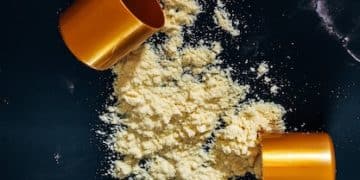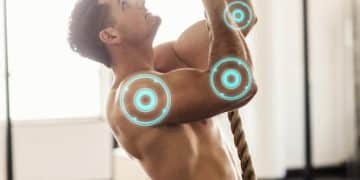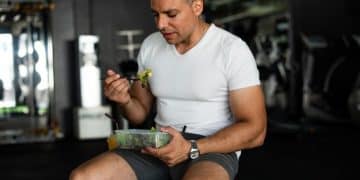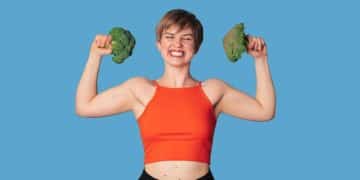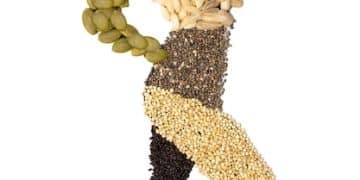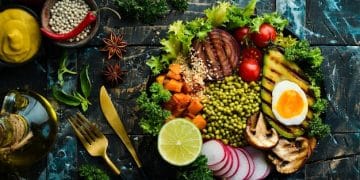The Dairy-Free Bodybuilding Nutrition Plan: Alternatives and Meal Ideas for 2025
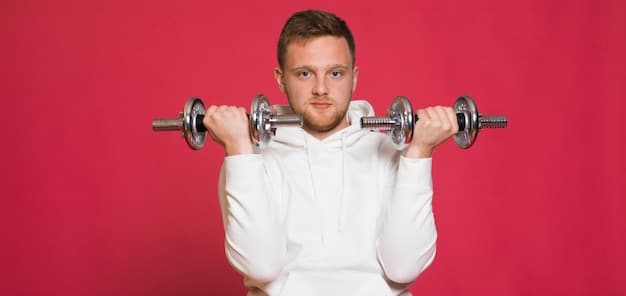
Achieving optimal bodybuilding results without dairy involves a strategic embrace of plant-based and alternative protein sources, alongside careful nutrient planning, to support muscle growth and recovery effectively.
Embarking on The Dairy-Free Bodybuilding Nutrition Plan: Alternatives and Meal Ideas for 2025 offers a compelling path for athletes seeking to optimize muscle gains and recovery while avoiding dairy products. This comprehensive guide will explore practical strategies, innovative food choices, and delicious meal ideas to fuel your fitness journey effectively.
Understanding the Dairy-Free Bodybuilding Landscape
The landscape of bodybuilding nutrition is constantly evolving, with more athletes exploring dietary paths that align with their health goals, ethical considerations, or allergen sensitivities. For many, a dairy-free approach is not just a preference but a necessity, presenting unique challenges and opportunities in nutrient sourcing. Understanding how to sustain muscle growth and recovery without traditional dairy products is crucial for success in 2025. This involves a deep dive into alternative protein sources, calcium fortification, and vitamin D synthesis, ensuring no nutritional gaps impede progress. Exploring the scientific basis for dairy removal, from gut health to inflammation, can further solidify the rationale behind this dietary shift.
Addressing Common Concerns
Transitioning to a dairy-free diet for bodybuilding can raise several questions, particularly regarding protein intake, bone health, and the convenience of meal preparation. Dispelling myths and providing evidence-based solutions is key to a smooth and successful transition. Many traditional bodybuilding diets heavily rely on dairy for protein, calcium, and quick calories, making the shift seem daunting. However, with careful planning, all essential nutrients can be sourced from non-dairy options, often with added benefits such as increased fiber intake and a broader spectrum of micronutrients.
- Protein Adequacy: Ensuring sufficient protein from plant-based sources like legumes, nuts, seeds, and protein powders.
- Calcium and Vitamin D: Identifying fortified non-dairy milks, leafy greens, and supplements to maintain bone density.
- Meal Planning and Preparation: Developing practical strategies for creating balanced, nutrient-dense dairy-free meals.
The Benefits Beyond Bodybuilding
While the primary focus is muscle development, adopting a dairy-free nutrition plan can yield broader health benefits. Reduced inflammation, improved digestion, and clearer skin are often reported by individuals who eliminate dairy from their diets. These systemic benefits can contribute to overall well-being, enhancing recovery and performance indirectly. The shift also encourages a more diverse diet, introducing new flavors and nutrient profiles that might otherwise be overlooked. This holistic approach to nutrition supports not only physical prowess but also long-term health and vitality.
Navigating a dairy-free bodybuilding diet requires a strategic mindset and a willingness to explore diverse food sources. The benefits extend beyond just muscle building, promoting overall health and potentially reducing common inflammatory responses often associated with dairy consumption. By understanding the nutritional nuances and embracing new dietary staples, athletes can confidently pursue their bodybuilding goals without compromising their health or principles.
Essential Nutrients: Dairy-Free Alternatives for Muscle Growth
For a dairy-free bodybuilding nutrition plan to be effective, a precise understanding of macro and micronutrient alternatives is paramount. Muscle protein synthesis, crucial for growth, relies on an adequate intake of essential amino acids, which are readily available in various dairy-free sources. Beyond protein, calcium, vitamin D, and creatine are vital for performance and recovery, and their dairy-free analogues must be strategically incorporated. This section delves into specific food categories and nutritional supplements that champion muscle development without relying on dairy.
Protein Powerhouses
The cornerstone of any bodybuilding diet is protein, and for dairy-free athletes, the options are plentiful and diverse. Plant-based proteins, when combined intelligently, can provide a complete amino acid profile necessary for muscle repair and growth. It’s not just about quantity but also about the quality and digestibility of these protein sources.
- Legumes and Pulses: Lentils, chickpeas, black beans, and kidney beans are rich in protein and fiber, promoting satiety and digestive health.
- Tofu and Tempeh: Soy-based products are complete proteins and incredibly versatile, suitable for various culinary applications.
- Nuts and Seeds: Almonds, walnuts, chia seeds, flax seeds, and hemp seeds offer a good blend of protein, healthy fats, and micronutrients.
- Plant-Based Protein Powders: Pea protein, rice protein, hemp protein, and blended plant protein powders can supplement dietary intake, especially post-workout.
Calcium and Bone Health
Maintaining strong bones is as critical for bodybuilders as muscle mass, especially given the high-impact nature of many training routines. While dairy is a common source of calcium, numerous plant-based foods and fortified products can adequately meet daily requirements. Vitamin D, on the other hand, facilitates calcium absorption, making its intake equally important.
Fortified non-dairy milks, such as almond milk, soy milk, oat milk, and rice milk, often come enriched with calcium and vitamin D, providing a convenient alternative to dairy. Additionally, certain vegetables like kale, broccoli, and collard greens are excellent calcium sources. Sunlight exposure and vitamin D supplements are also key considerations, particularly for those with limited sun exposure.
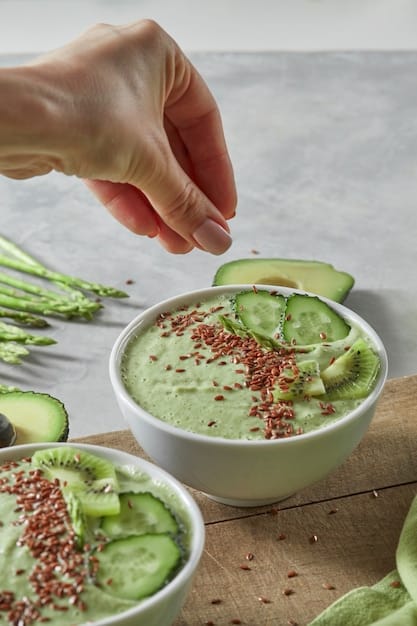
Beyond the Basics: Creatine, B12, and Iron
Beyond the primary macronutrients, dairy-free bodybuilders must also pay attention to other essential nutrients. Creatine, naturally found in animal products, is often supplemented by bodybuilders. While some plant-based sources contain small amounts, supplementing is typically recommended for those following a strictly plant-based diet. Vitamin B12, predominantly found in animal products, is crucial for nerve function and red blood cell production, necessitating supplementation or consumption of fortified foods for dairy-free individuals. Iron, vital for oxygen transport, can be found in legumes, spinach, and quinoa, though combining plant-based iron with vitamin C can enhance absorption.
By thoughtfully selecting and combining a variety of dairy-free foods, athletes can build a robust nutritional foundation that supports intense training and muscle recovery. The focus shifts from dairy dependence to a broad spectrum of plant-based goodness, ensuring all essential building blocks are in place for optimal performance and health. This strategic approach not only meets physiological demands but also opens up a world of culinary possibilities.
Strategic Meal Planning for Dairy-Free Bodybuilders
Effective meal planning is the backbone of any successful bodybuilding regimen, and for those eschewing dairy, it becomes an even more critical exercise in strategic nutrition. Beyond simply replacing dairy, the goal is to create a balanced, diverse, and enjoyable diet that consistently fuels muscle hypertrophy and facilitates recovery. A well-structured meal plan ensures consistent nutrient delivery, helps manage preparation time, and keeps motivation high. This section outlines practical approaches to meal timing, macro distribution, and variety within a dairy-free framework, aiming for optimal performance and adherence.
Optimizing Macro Distribution
The typical bodybuilding macro breakdown—high protein, moderate carbohydrates, and adequate healthy fats—remains relevant for dairy-free diets. The key difference lies in sourcing these macros. Protein intake should prioritize complete plant-based sources or intelligent combinations of incomplete proteins throughout the day. Carbohydrates, essential for energy and muscle glycogen replenishment, can come from whole grains, fruits, and vegetables. Healthy fats, critical for hormone production and nutrient absorption, are abundant in nuts, seeds, avocados, and certain plant oils.
Timing meals strategically around workouts is also important. A pre-workout meal rich in complex carbohydrates and moderate protein provides sustained energy, while a post-workout meal focusing on quick-digesting proteins and carbohydrates aids rapid recovery. Distributing protein intake evenly across all meals can maximize muscle protein synthesis throughout the day.
Creative Meal Ideas and Recipes
Innovation in the kitchen is a significant advantage for dairy-free bodybuilders. Moving beyond traditional recipes and exploring new ingredients can make the dietary journey both effective and exciting. The versatility of plant-based foods allows for a wide array of flavors and textures, ensuring meals are far from monotonous.
- Breakfast Power Bowls: Oat-based porridges with plant protein powder, nuts, seeds, and berries.
- Lunchtime Fuel: Large salads with grilled tofu or tempeh, a mix of legumes, and a tahini-based dressing.
- Dinner Delights: Lentil or bean-based curries with brown rice, or a hearty vegetable and seitan stir-fry.
- Snack Solutions: Rice cakes with almond butter, edamame, protein shakes made with plant milk, or a handful of mixed nuts.
The Art of Batch Cooking and Preparation
Consistency is paramount in bodybuilding, and batch cooking is a powerful tool for maintaining a dairy-free diet. Dedicating a few hours once or twice a week to prepare staple components—like cooked grains, roasted vegetables, and a batch of cooked legumes—can significantly reduce daily cooking time. This not only makes adherence easier but also ensures healthy, home-cooked meals are always within reach, preventing reliance on less optimal choices.
Strategic meal planning, coupled with creative cooking and efficient preparation, empowers dairy-free bodybuilders to meet their nutritional demands effectively. It transforms the dietary challenge into an opportunity for culinary exploration and deeper nutritional understanding, fostering a sustainable pathway to achieving peak physical condition. The focus remains on nutrient density and balance, ensuring every meal contributes meaningfully to muscle growth and overall well-being.
Supplements for the Dairy-Free Bodybuilder
For many bodybuilders, supplements play a crucial role in optimizing performance, recovery, and hypertrophy, and this holds true for those following a dairy-free nutrition plan. While a whole-food diet is the foundation, supplements can fill potential nutrient gaps and provide an edge in achieving specific fitness goals. The dairy-free landscape necessitates careful selection of supplements, ensuring they are free from milk-derived ingredients such as whey, casein, or lactose. This section explores key supplements that can benefit dairy-free bodybuilders, emphasizing their non-dairy alternatives and proper usage.
Protein Powders: The Cornerstone Supplement
Protein powder remains one of the most widely used supplements in bodybuilding for its convenience and ability to quickly deliver amino acids. For dairy-free athletes, choosing the right source is critical.
- Pea Protein: A highly digestible, complete protein source, excellent for muscle recovery and growth.
- Rice Protein: Often combined with pea protein to create a complete amino acid profile, suitable for those with multiple sensitivities.
- Hemp Protein: Rich in omega-3 and omega-6 fatty acids, along with fiber, offering more than just protein.
- Soy Protein: A complete protein source, though some prefer other alternatives due to personal preferences or potential estrogenic concerns (which research largely refutes for moderate consumption).
When selecting any plant-based protein powder, it is important to check labels for hidden dairy ingredients or cross-contamination warnings, especially for individuals with severe allergies.
Creatine and BCAAs: Performance Enhancers
Creatine monohydrate is one of the most researched and effective supplements for increasing strength, power, and muscle mass. Fortunately, most creatine supplements are synthetic and therefore naturally dairy-free. Similarly, branched-chain amino acids (BCAAs)—leucine, isoleucine, and valine—can aid muscle recovery and reduce fatigue during workouts. While traditional BCAA sources can be animal-derived (including some dairy processes), many reputable brands offer plant-based, fermented BCAAs specifically from corn or other vegetable sources, making them suitable for dairy-free diets.
Always verify the source and processing methods to ensure no dairy components are involved. These supplements can play a significant role in enhancing workout capacity and accelerating recovery, allowing for consistent high-intensity training. They are not replacements for a robust diet but rather complements to it.
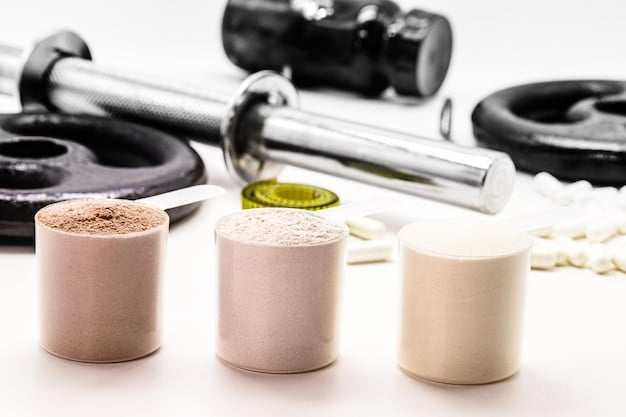
Micronutrient Support: B12, D3, and Omega-3
While not directly for muscle building, these micronutrients are vital for overall health and performance, and dairy-free diets often require careful attention to their intake.
- Vitamin B12: Exclusively found in animal products, dairy-free athletes must supplement with B12 or consume fortified foods. Its deficiency can lead to fatigue and neurological issues, severely impacting training.
- Vitamin D3: Crucial for bone health, immune function, and muscle function. While sunlight is a primary source, many D3 supplements are animal-derived (from lanolin). Vegan D3 from lichen is available and recommended for dairy-free individuals.
- Omega-3 Fatty Acids: Important for reducing inflammation and supporting joint health. While fatty fish are common sources, dairy-free alternatives include flaxseed oil, chia seeds, and algae-based EPA/DHA supplements.
Choosing the right supplements meticulously can bridge nutritional gaps and elevate performance for dairy-free bodybuilders. It’s imperative to research brands, read labels diligently, and consult with a nutritionist or healthcare professional to tailor a supplement regimen that truly aligns with individual needs and dietary restrictions. This comprehensive approach ensures that every aspect of nutritional support is covered, paving the way for sustained progress and optimal health.
Overcoming Challenges and Staying Motivated
Adopting and adhering to a dairy-free bodybuilding nutrition plan presents its unique set of challenges, from social situations to navigating food labels and overcoming cravings. However, with the right strategies and a resilient mindset, these hurdles can be effectively managed, ensuring long-term success and sustained motivation. The journey isn’t just about what you eat, but how you psychologically approach dietary changes and maintain consistency in the face of obstacles.
Navigating Social and Dining Situations
Eating out or attending social gatherings often involves navigating menus laden with dairy. Planning ahead is crucial. Researching restaurant menus online beforehand, communicating dietary needs clearly to servers, or even suggesting dairy-free friendly venues can ease the process. Bringing your own compliant snacks or a small meal to parties can also prevent accidental dairy exposure or feeling deprived. Educating friends and family about your dietary choices can foster support and understanding, making social situations less stressful.
Reading Labels and Identifying Hidden Dairy
Dairy can be surprisingly present in many processed foods, often under less obvious names. Learning to meticulously read food labels is an invaluable skill. Ingredients like casein, whey, lactose, milk solids, rennet casein, and even ingredients like “natural flavors” or “caramel color” can sometimes hide dairy components. Opting for whole, unprocessed foods naturally minimizes this risk. When purchasing packaged goods, look for certifications like “dairy-free,” “vegan,” or “plant-based” to ensure compliance.
This diligence ensures that your diet remains truly dairy-free, preventing setbacks in your bodybuilding progress due to unintentional consumption. Over time, identifying dairy-free products becomes second nature, streamlining your grocery shopping process.
Dealing with Cravings and Maintaining Consistency
Cravings, especially for familiar dairy products, are a common challenge. Substituting dairy favorites with equally satisfying dairy-free alternatives can help. For example, creamy sauces can be made with cashew cream or nutritional yeast for a cheesy flavor. Dairy-free ice creams, yogurts, and cheeses have also improved significantly in taste and texture. Focusing on the positive outcomes—improved digestion, reduced inflammation, and ethical alignment—can reinforce motivation. Celebrating small victories, such as successfully maintaining your diet for a week or trying a new dairy-free recipe, can also boost morale.
Maintaining consistency requires discipline, but also self-compassion. Occasional slip-ups are part of any dietary journey; the key is to learn from them and quickly get back on track without self-reproach. Building a strong support system, whether through online communities or friends with similar dietary preferences, can also provide encouragement and accountability. Ultimately, seeing the tangible results in your physique and overall health will be the most powerful motivator for staying on the dairy-free path.
Advanced Strategies for Dairy-Free Bodybuilding in 2025
As dairy-free bodybuilding continues to evolve, advanced strategies are emerging to further optimize performance, adaptation, and sustained progress. Beyond basic substitutions, these involve a deeper understanding of nutrient synergy, gut health, and personalized nutrition. The year 2025 will likely see an increased emphasis on precision nutrition, leveraging data and emerging research to fine-tune dairy-free diets for individual athletes. This section explores cutting-edge approaches designed to push the boundaries of what is possible without dairy.
Optimizing Gut Health and Nutrient Absorption
A healthy gut microbiome is fundamental to optimal nutrient absorption and overall well-being, which directly impacts bodybuilding results. For dairy-free individuals, fostering a robust gut environment is paramount. Incorporating probiotic-rich foods such as fermented vegetables (sauerkraut, kimchi), kombucha, and dairy-free yogurts can introduce beneficial bacteria. Prebiotic fibers found in oats, bananas, and asparagus feed these beneficial bacteria, creating a thriving gut ecosystem.
Improved gut health translates to more efficient digestion and absorption of proteins, carbohydrates, and micronutrients essential for muscle growth and recovery. Furthermore, a balanced gut can reduce systemic inflammation, allowing the body to dedicate more resources to muscle repair and growth rather political. Personalized approaches to gut health, often guided by microbiome testing, are becoming more accessible, allowing for highly targeted dietary interventions.
The Role of Food Synergy and Combinations
Nutrient absorption isn’t just about what you eat, but how you combine foods. Food synergy refers to how different compounds in foods interact to enhance their beneficial effects when consumed together. For instance, pairing plant-based iron sources (like lentils or spinach) with vitamin C-rich foods (such as bell peppers or citrus fruits) significantly boosts iron absorption, a common concern for plant-based athletes. Similarly, combining different plant protein sources throughout the day or even in the same meal (e.g., rice and beans) ensures a complete amino acid profile, maximizing protein synthesis.
Understanding these synergistic relationships allows dairy-free bodybuilders to get the most nutritional bang for their buck from every meal, ensuring all micronutrient and macronutrient needs are met efficiently without resorting to excessive supplementation.
Personalized Nutrition Through Tracking and Biofeedback
The future of bodybuilding nutrition, especially dairy-free, lies in personalization. Leveraging wearable technology, continuous glucose monitors, and advanced blood tests, athletes can gain unprecedented insights into their body’s unique responses to diet and training. Tracking macros and micros meticulously, alongside subjective biofeedback (energy levels, recovery rates, sleep quality), allows for real-time adjustments to the nutrition plan.
- Data-Driven Adjustments: Using data from fitness trackers and blood tests to fine-tune calorie and macronutrient intake.
- Hormonal Balance: Monitoring key hormonal markers to ensure dietary choices support an anabolic environment.
- Recovery Optimization: Adjusting nutrient timing and types based on recovery metrics to enhance performance.
This level of precision nutrition enables dairy-free bodybuilders to optimize their diet not just for muscle growth but for overall physiological efficiency and longevity in the sport.
| Key Aspect | Brief Description |
|---|---|
| 🌱 Plant-Based Proteins | Utilize legumes, tofu, nuts, and seeds for complete amino acid profiles essential for muscle growth. |
| 🦴 Bone Health Focus | Rely on fortified non-dairy milks, leafy greens, and supplements for calcium and vitamin D. |
| 🥗 Meal Planning & Synergy | Strategically combine foods for enhanced nutrient absorption; focus on macro timing around workouts. |
| 💊 Smart Supplementation | Incorporate plant-based protein powders, creatine, B12, D3, and Omega-3s to fill nutritional gaps. |
Frequently Asked Questions About Dairy-Free Bodybuilding
▼
Absolutely. Muscle growth predominantly relies on adequate protein intake, caloric surplus, and resistance training. Dairy is just one source of protein; many plant-based alternatives like legumes, tofu, nuts, and seeds provide all essential amino acids needed for muscle protein synthesis.
▼
Optimal dairy-free protein sources include pea protein, hemp protein, and rice protein powders. For whole foods, prioritize tofu, tempeh, lentils, chickpeas, and a variety of nuts and seeds. Combining diverse plant proteins ensures a complete amino acid profile for muscle repair and growth.
▼
Dairy-free bodybuilders should focus on fortified plant milks (almond, soy, oat), leafy green vegetables like kale and broccoli, and calcium-set tofu. Ensuring sufficient vitamin D through sunlight or supplements is also crucial, as it aids calcium absorption and bone mineralization.
▼
While a well-planned dairy-free diet can be complete, some nutrients may require attention. Vitamin B12, typically found in animal products, often requires supplementation. Omega-3 fatty acids (EPA/DHA) from algae and iron from legumes, fortified foods, or dark leafy greens are also important considerations.
▼
Common challenges include navigating social eating, identifying hidden dairy in processed foods, and managing cravings. Overcome these by planning meals, reading labels meticulously, discovering delicious dairy-free alternatives, and focusing on the long-term health benefits and increased performance from your dietary choices.
Conclusion
The transition to a dairy-free bodybuilding nutrition plan is not merely a dietary restriction but an opportunity to explore a diverse array of nutrient-dense foods that can profoundly impact muscle growth, recovery, and overall health. Far from limiting, this approach broadens one’s culinary horizons, encouraging a deeper understanding of food and its synergistic effects on the body. By prioritizing whole plant-based proteins, smart supplementation, and meticulous meal planning, athletes can achieve their physique goals while potentially experiencing benefits like improved digestion and reduced inflammation. The journey demands a strategic mindset, but the rewards—in terms of both performance and well-being—are substantial, positioning dairy-free bodybuilding as a powerful, sustainable path for 2025 and beyond.
